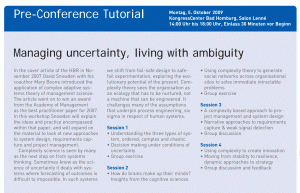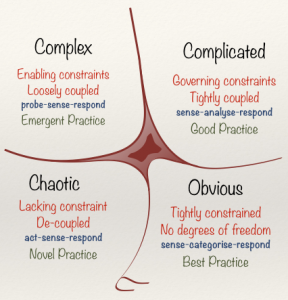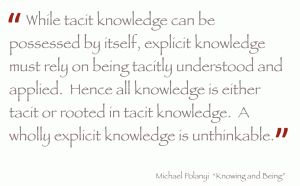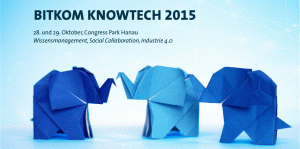11. Kongress Wissensmanagement
am 6.-7. Oktober 2009
in Bad Homburg
Pre Conference
Im Vorfeld der KnowTech fand am 5. Oktober ein Pre-Conference Tutorial mit Dave Snowden in einem kleinen Kreis von 12 Teilnehmern statt, das unter dem Motto stand:
“Managing uncertainty, living with ambiguity” ~ Dave Snowden, Founder & Chief Scientific Officer, Cognitive Edge Pte Ltd, Marlborough (UK)
In the cover article of the HBR in November 2007 David Snowden with his coauthor Mary Boone introduced the application of complex adaptive systems theory of management science. The article went on to win an award from the Academy of Management as the best practitioner paper for 2007. In this workshop Snowden will explain the ideas and practice encompassed within that paper, and will expand on the material to look *at new approaches* *to system design, requirements capture* *and project management.* Complexity science is seen by many as the next step on *from systems* *thinking. Sometimes know as the science* *of uncertainty* it deals with systems where forecasting of outcomes is difficult to impossible. In such systems we shift from *fail-safe design to safefail* *experimentation,* exploring the evolutionary potential of the present. Complexity theory sees the organisation as an ecology that has to be nurtured, not a machine that can be engineered. It challenges many of the assumptions that underpin process engineering, six sigma in respect of human systems.
Keynote
Im Folgenden hielt Dave Snowden ebenfalls eine Keynote zum Thema (cc-licenced PDF)
“Knowledge management and natural science, including the science that makes social computing work”
Cynefin Framework
Weitere Infos zum Cynefin-Modell bei : cognitive-edge.com
“While tacit knowledge can be processed by itself, explicit knowledge must rely on being tacitly understood and applied. Hence all knowledge is either tacit or rooted in tacit knowledge. A wholly exlicit knowledge is unthinkabe.” ~ Polányi Mihály (11 March 1891 – 22 February 1976)
Kongress
Das Kongressprogramm mit ca. 80 Anwenderberichten und Beiträgen umfasste verschiedene Themenbereiche:
- Wissensmanagement – strategische Vorteile in wirtschaftlich schwierigem Umfeld
- Business Intelligence Self-Services – Schlüsselkonzept für moderne Wissensarbeiter bei sinkendem IT Budget
- Lernende Organisationen – gute Praktiken und Erfolgsmuster
- Generationsübergreifender Wissenstransfer am Arbeitsplatz
- „Generation Internet“ im Wissensmanagement von morgen
- Collaboration und Enterprise 2.0
- Wissensmanager in eigener Sache – Getting things done
- Intellectual Property und Datenschutz im Wissensmanagement
- Wissensorientiertes Prozess-Management – Prozessorientiertes Wissensmanagement
- Innovative Methoden und Technologien für Wissensmanagement – Clouds, Semantics
- Wissen – Macht – Finanzen: Dialog für die Wissensgesellschaft
- Wissensmanagement im Öffentlichen Dienst – Einsatzszenarien, Best Practices
Die Keynotes deckten ein breites Spektrum ab, u.a. mit:
- Achim Berg, Geschäftsführung Microsoft Deutschland, Überblick über das “Neue Arbeiten”
- Dr. Utz Claasen, ehemals EnBW und jetzt BDI: “Wertschaffung durch Wissensmanagement”
- Dave Snowden: “Why does Social Computing work?”
Weitere Infos
Weiterführende Informationen zu BITKOM : Bundesverband Informationswirtschaft, Telekommunikation und neue Medien e.V.
Know Tech
Aktuelle Infos zur KnowTech unter : www.knowtech.net







